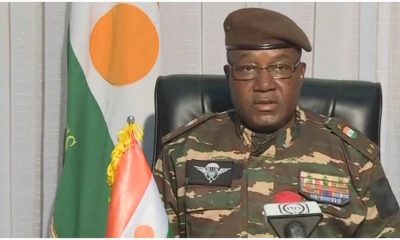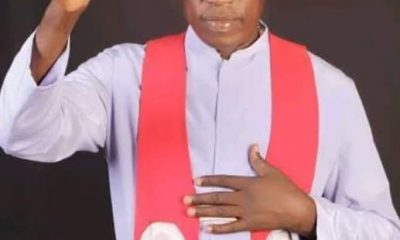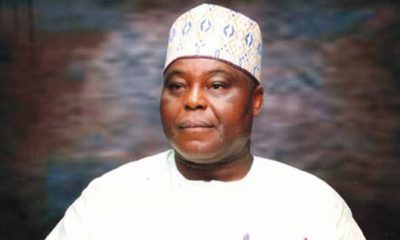News
Dokpesi: The Big Masquerade Leaves the Stage

By Augustine Okhiria Agbonsuremi
My first encounter with Chief Raymond Aleogho Dokpesi was in 1994 when he graciously gave me an opportunity to move over to his new radio station, Raypower FM, Lagos, as a Stringer, following the closure of Rutam House and the proscription of The Guardian Newspapers Group, where I worked as a reporter.
The then Director of News, Ladi Lawal, of blessed memory, had accepted the recommendation of Kelly Elisha, my senior colleague on the judiciary beat, for me to be considered on the list of “distressed journalists” of the 18 media organizations shut down by iron man, General Sani Abacha.
The following 25 years were packed with a stretch of professional accomplishments I derived through the massive and, arguably, the most influential broadcast group in Nigeria supervised directly by this colossus.
You can’t work closely with High Chief without being infected by his passion for hard work.
He was a leader who had unique relationships with each one who worked with him. Everyone had an incredible positive encounter with this Superman.
He taught us not to take a no for an answer. We knew through him and the late GMD, Ladi Lawal (whom he said understood his vision more than any other person), not to postpone, till later or tomorrow, any duty that can be performed today.
He was a workaholic.
High Chief Raymond Dokpesi had a character typical to many highly cerebral and intelligent individuals. I call it “Intelligence Malaise “ – the Propensity of brilliant individuals to want to stay guiding and supervising all tasks to be performed. They always want to do it here and now by themselves and in their presence or under their supervision.
We saw him at sites with headpans carrying concrete mix on his head in Alagbado, and he was physically at the outside broadcast locations with the teams to ensure everything ran smoothly at the beginning of AIT.
He was a restless leader who craved perfection in all assignments.
Though “a bloody (marine) engineer,” as he would often refer to himself, he owned the original concepts of many programmes on radio and television. Anytime he calls the news and programmes management teams for a meeting, it is always certain that it would be an ideation meeting over a programme concept. He was the quality control person behind major programmes on the air.
His relationship with staff was more than that of a worker and an owner of the business. He gave everyone the opportunity of access to him.
High Chief was a very informal person, and he could have a meeting with staff on very serious assignments on the spot at any time. Oftentimes, he moves to our offices for meetings. He believes in positive results. He loves you extra if you are result-oriented.
I had a very close and personal relationship with him.
Perhaps he concluded that I took this relationship for granted in my push to get things done correctly. And when I told him during a meeting with top management staff to get serious about how he runs DAAR, he fired me from the company. It was the second time I accused him of unseriousness within two weeks. I was tired of the work environment made toxic by the unwillingness of management to attend to the legitimate needs of staff, including payment of salaries.
The audacity was loud, but I owed him the truth. He knew I was very vocal, and he tolerated me for years, but this time, I drew out his anger, and he gave me the boots.
That was in February 2018, when staff morale was very low, with a backlog of several months of salaries.
I knew it was a hard one, but I also knew it would take a friend to tell him the truth. The outcome was, expectedly, disastrous for our warm and cordial relationship. It was the wrong cap on a blossoming friendship of over 25 years.
During these years, I had phenomenal professional growth and exposure due to his uncommon love, care and support.
For our outspoken and bold interventions in the handling of political programs on the air, we needed his support to do our job well. He gave us support without interfering with the content.
“You will not even spare my friends,” he once told me.
“Chairman, tell your friends to stay on the path of honour,” I responded. And he offered me a handshake, with both of us laughing loud.
There were three occasions he singled me out for unqualified favour. I will tell just one of them.
Sometimes in 1996, just before AIT was launched, and barely a year after I was formally integrated as a staff of DAAR, the newsroom management decided to reorganize operations.
I was Head Reportorial, despite my junior-level position in the newsroom. This supervisory position was artificial because I never really supervised senior reporters. There were senior colleagues supervising all of us. Still, I was experienced enough to put their reports together for Raypower’s flagship news magazine program in the afternoon, Metro Despatch.
The proposal before him from the newsroom management was, among others, to replace me as Head Reportorial with another very hardworking and experienced colleague from the Concord Stable, Bayo Adeyinka.
He sighted me in the premises through his glass office, opened the window and called my attention. I rushed up to his office, where he told me that I was being replaced as Head, Reportorial and requested to know what the problem was.
I told him nothing was wrong, and he asked me to go.
It was the first time I entered his office alone, besides the few occasions I attended meetings with others.
But he had met me in the newsroom on many occasions working alone in the dead of the night when I faced the task of preparing reports for “CASE FILE,” a segment of judicial reports on the Ultimate Morning Show (UMS). On each occasion, he would bang on the Newsroom door, and when I opened the door, he would give me jovial salutations and move on to his regular night inspections of the offices and the live studio.
I was still thinking of the information he gave me in his office when he came to the newsroom.
Unknown to me, he had his plans.
He came into the newsroom with approvals for all the recommended appointments, including my removal.
But he looked up to everyone and asked jokingly what they now wanted to do with “this man,” pointing in my direction.
Before anyone could answer, he announced that because of the transition program by the military and the emerging political development towards civil rule, he was recommending the setting up of the Political Desk.
He also immediately announced that, based on my experience, having studied my file, I was best suited to head and nurture that desk. He also elevated me to Assistant Manager, jumping three ranks above my peers.
From Assistant Manager, Political Desk, I rose through the ranks in over 20 years to the group’s Director in charge of Politics. I served as the Director of AIT Parliamentary Channel on DAARSat, the still-born Direct Broadcast Satellite Services of DAAR Plc.
High Chief Raymond Dokpesi stood by me like a rock to succeed in my office, helping me with contacts, resources and ideas.
He approved my posting to the Presidential Villa as a State House correspondent 1999. He sent me to Port Harcourt as Assistant General Manager/Bureau Chief to run two radio stations – Raypower 1 and 2 – and AIT, the TV station. I had pieces of training at BBC in London and at Cologn and Berlin at Deutsche Welle, Germany.
High Chief Dokpesi watched over our shoulders and protected some of us from being eliminated by military agents during the dark Abacha days. The “NADECO 2” in the newsroom – Adebayo Bodunrin and I (we were political reporters, and we were tagged supporters of the National Democratic Coalition) regularly came under threat because of our work. Still, Chairman would ask us to go under until we were safe again. Ambrose Somide, though not in the newsroom, was also under the same threat because of his voice on radio.
After I was sent on “Compulsory Retirement,” I wrote a letter of appreciation to him, thanking him for my opportunity to use his media platforms to blossom in my broadcast and journalism career. He did not acknowledge my letter.
Before I left for Canada in 2020 to stay with my ailing wife, I also visited him with a bottle of champagne and wines along with Dr. Adaobi Obiabunmuo, Program Manager at PRIMORG, to renew my loyalty and appreciation to him despite the manner of my departure from DAAR.
It was my little way to say “thank you” to this great man who provided me with the platform and unqualified friendship for my 25 years in the broadcast arena.
Recently, I sensed that something was wrong somehow when the High Chief sent a message to me through a comment on my Facebook page to commiserate with me upon the passing of my wife, Mercy.
He didn’t call or send a text message to my phone. I was curious but delighted to hear from him.
He disclosed that he got the news when his “health was very bad.” That line got me worried.
He wrote:
“Austin,
Tosin called to inform me about the passage of your wife at a time when my health was very bad. We prayed for her and you with the surviving children. Be very strong as we pray that her soul should rest in perfect peace and perpetual light shine on her soul. May God grant you and the family the fortitude and grace to bear this irreparable loss at a time she is most needed. Be strong Austin. Take consolation in the fact that she fought a good fight, and you stood by her till the last minute. God bless you and all the kids you now have to father & mother.”
I responded:
“Thank you, my chairman, for your prayers and valuable counsel. May God strengthen you and grant you good health.”
I contacted his wife, Madam Tosin, immediately, and she assured me he was fine and abiding by the Doctor’s instructions.
I was earnestly looking forward to visiting him anytime I visit Nigeria.
No matter what you think or say about him, Chairman, as we called him, positively impacted so much on everyone within his spheres.
I was privileged to have an exceptional relationship with him. I was one of the few staff who exercised the opportunity to get to his bedroom whenever I needed to see him urgently, even when he was resting.
He told me: “If it’s urgent and I am sleeping, wake me up.”
As Director in charge of the Political Desk, I got tips and updates regularly from him because he was always a step ahead no matter how much I tried to get top political information.
Writing about a life encounter with Chief Raymond Aleogho Dokpesi is like writing about the good dance of a masquerade after watching from the sidelines. What you write is what you can see from your corner of the big circle.
And when the masquerade has thrilled everyone, a benevolent writer will not bother writing about the wrong steps and momentary falls.
My chairman was a big masquerade. He had his adventures, controversial steps and style, which can not diminish his towering successes and accomplishments.
As a big masquerade, he thrilled everyone. He had his head well above his peers.
His departure leaves a big vacuum in the Nigerian media space that will be difficult to fill.
Augustine Okhiria Agbonsuremi is the Executive Director of PRIMORG.
He writes from Regina, Saskatchewan,
Canada
agbonsuremi@yahoo.com
News
Two Nigerians win Germany Science awards

Two Nigerian-born scientists—Adesola Adegoke, a researcher at Arizona State University (ASU), and Seunnla Adelusi, a PhD candidate at the Université de Sherbrooke, Canada—have been named among the 20 global winners of the Digital GreenTalents Award 2025.
These two Nigerians were announced among the winners during a virtual ceremony held on 25 November. In a statement following the virtual announcement ceremony, the organisers said the 20 awardees for this year joined from different time zones, including “very early morning in Canada and evening hours in the Philippines.”
The digital Green Talent Award is an annual initiative of the German Federal Ministry of Education and Research (BMBF) that recognises outstanding young researchers whose work advances sustainability through digital innovation.
Each year, 20 scientists are selected from a competitive global pool for their cutting-edge ideas at the intersection of digitalisation and environmental sustainability.
News
Gov Alex Otti visits Nnamdi Kanu in Sokoto prison

Alex Otti, the Abia State Governor, on Sunday paid a visit to the detained leader of the Indigenous People of Biafra (IPOB), Nnamdi Kanu, at the Sokoto Correctional Centre.
The governor was accompanied by officials of the Sokoto State Government during the closed-door visit.
Nnamdi Kanu was recently moved to Sokoto after he was convicted on terrorism-related charges and handed a life sentence by a Federal High Court in Abuja.
Governor Otti had earlier promised to pursue every lawful and political avenue to ensure that Kanu gets justice. Sunday’s visit is seen as part of ongoing efforts by the Abia State Government regarding his case.
Details of the meeting were not made public as of the time of this report.
News
Terrorists abduct bride, bridesmaids in Sokoto attack

Armed terrorists have abducted a bride-to-be, her bridesmaid, and eight other residents from Chacho village in Wurno Local Government Area of Sokoto State
The Sokoto abduction occurred around 1:30 a.m., according to residents, when the attackers stormed the village. Most of the victims were women, with only one man also taken.
One resident sustained injuries and is receiving medical treatment. Villagers told reporters that the bride was preparing for her wedding scheduled for later that morning when the raid struck, plunging the community into shock and mourning.
A community member described the attack as “tragic,” noting the delay in security response. “Security operatives were alerted immediately, but they only arrived about an hour after the bandits had fled,” he said, expressing frustration.
-

 News2 years ago
News2 years agoBreaking: Tinubu’s authentic ministerial nominees
-

 News9 months ago
News9 months agoSenate to speed up conclusion of Nigeria Forest Security Service Bill
-

 News2 years ago
News2 years ago“Anytime we want to kill terrorists, President would ask us to take permission from France but they were killing our soldiers-” Niger Republic coup leader
-

 News2 years ago
News2 years ago“I’m leaving the Catholic church because Bishop Onah is oppressing me,” says Okunerere
-

 News2 years ago
News2 years agoRadio Nigeria’s veteran broadcaster Kelvin Ugwu dies three months after retirement from service
-

 News2 years ago
News2 years agoDokpesi and the Gazebo Mystique
-

 News2 years ago
News2 years agoTsunami: Tinubu orders dissolution of managements, boards of MDAs, to sack all Buhari’s political appointees
-

 News2 years ago
News2 years agoPersons against Allagoa’s reforms behind protests at NSITF
